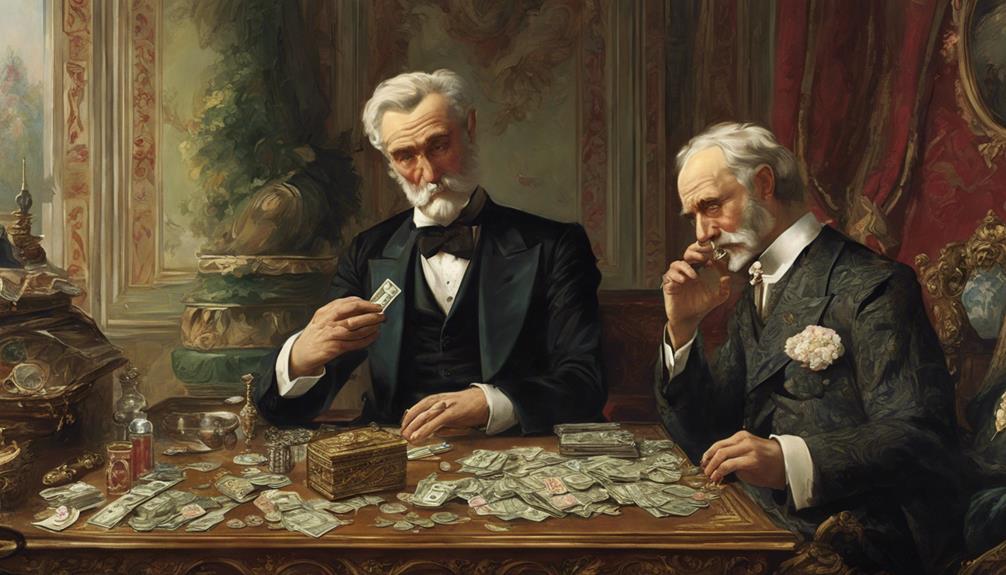In the marriage proposal, you see each character’s mixed motivations come to the forefront. Lomov’s driven by a desire for financial security and societal acceptance, with his age and health concerns pushing him to propose. Natalya feels pressured by societal norms to marry for stability and respectability, revealing her inner conflict between personal desires and external expectations. For Chubukov, it’s a chance to bolster his financial and social standing by marrying off his daughter. Their comedic misunderstandings highlight the absurdities in their interactions. Discover how these complex motivations shape the chaotic yet significant proposal and its broader implications.
Lomov’s Quest for Stability

Although Lomov’s marriage proposal may seem driven by personal affection, it’s primarily a calculated move to achieve financial stability. At 35, Lomov feels the weight of societal expectations pressing down on him. You’re aware of how critical this union is for him, merging two family estates to bolster his economic standing. This proposal isn’t just about romance; it’s a strategic step to secure his future and alleviate his financial anxieties.
Personal insecurities also play a significant role in Lomov’s decision. You might sense his desperation, as his health anxieties and loneliness push him towards marriage. He sees this partnership as a buffer against the chaotic pressures surrounding him, offering a stable domestic life.
The urgency of his proposal underscores his need to conform to societal norms, which dictate that an unmarried man of his age should be settled and secure.
This blend of financial motives and personal vulnerabilities reveals a man keen to fulfill both his emotional needs and societal obligations. Lomov’s marriage proposal is a reflection of his quest for security, as he navigates the delicate balance between personal desires and external expectations.
Natalya and Societal Expectations
While Lomov seeks stability through marriage, Natalya faces her own set of pressures rooted deeply in societal expectations. As an unmarried woman at 25, Natalya Stepanovna feels the weight of societal norms urging her to marry. This makes the marriage proposal significant not just for her personal desires but also for fulfilling societal obligations.
For Natalya, marriage isn’t just about love or companionship; it’s about securing a stable financial future and enhancing her social standing.
- Cultural Norms: Society views unmarried women like Natalya as burdensome, increasing the urgency to marry. This pressure highlights how societal expectations shape her actions and desires.
- Agency and Assertiveness: Natalya’s assertiveness in pursuing Lomov reflects her attempt to navigate these societal pressures. She wants to reclaim her agency within these confines, showing how the characters of the play balance personal and societal demands.
- Familial Reputation: The proposal’s significance extends beyond Natalya herself. It’s essential for her family’s reputation, emphasizing how marriage impacts social standing and secures financial stability.
In the play, Natalya’s motivations illuminate the tension between personal aspirations and societal obligations, making the marriage proposal a pivotal moment.
Chubukov’s Financial Priorities

Chubukov’s financial priorities drive his actions regarding the marriage proposal. You’re observing a man who’s acutely aware of the economic benefits marriage can bring. For Chubukov, the proposal isn’t just about uniting two families; it’s a strategic move to guarantee financial stability.
By marrying his daughter to Lomov, he envisions an increase in economic resources through the union of their estates. This potential boost in wealth offers a solid base for his daughter’s future and his own financial security.
You’re witnessing a father who’s motivated by societal pressures that equate marriage with enhanced social standing and economic prosperity. Chubukov’s enthusiasm to facilitate this proposal stems from his desire to relieve the financial burdens of raising an unmarried daughter.
In a society that often devalues single women, he sees this marriage as a necessary step. His approach is pragmatic, and his manipulative tactics reveal that, for him, financial gain takes precedence over genuine affection or personal desires.
As you explore deeper, it’s clear that Chubukov’s actions are driven by the need to secure a stable future. The marriage proposal becomes a tool to achieve economic reassurance, underscoring his financial priorities.
Absurdity in Interactions
The interactions surrounding Lomov’s marriage proposal are a masterclass in absurdity, driven by miscommunication and misplaced priorities. Each character becomes entangled in a web of misunderstandings that turn a simple proposal into a chaotic spectacle.
Lomov, keen to secure a marriage, finds himself embroiled in petty arguments rather than romantic exchanges. His intentions become lost amid disputes over trivial matters like property, amplifying the absurdity of their interactions.
Natalia, caught between her desires for social status and constant bickering, contributes to the farcical nature of the proposal. Her passionate outbursts mask her true feelings, emphasizing how societal pressures distort genuine communication.
Tschubukov’s responses only add to the comedic chaos. His fluctuating reactions, oscillating between enthusiasm and frustration, mirror the absurdity of prioritizing societal conventions over genuine emotion.
Instead of fostering understanding, these interactions devolve into a series of ridiculous events culminating in Lomov’s fainting spell, a climax that epitomizes the proposal’s absurdity.
Here’s a snapshot of the absurdity:
- Petty Arguments: Characters argue over trivialities, sidelining genuine emotions.
- Miscommunication: Misunderstandings overshadow true intentions.
- Societal Pressures: Characters prioritize convention over connection.
Personal Desires Vs. Conventions

Amidst the comedic chaos and absurdity of the proposal, a deeper conflict simmers beneath the surface: the tension between personal desires and societal conventions.
As you explore Lomov’s motivations, you’ll notice his marriage proposal isn’t just about love. It’s driven by a need for companionship and financial stability, highlighting how his personal desires clash with societal pressures to marry by 35. This duality underscores his insecurities, revealing a struggle between seeking individual happiness and conforming to societal norms.
Natalya’s urgency to marry further illustrates this conflict. At 25, she faces societal conventions labeling her as burdensome if unmarried. Her personal desires for a fulfilling relationship are overshadowed by the pressure to meet traditional expectations. Her actions show how societal conventions often dictate the trajectory of personal desires, forcing individuals to prioritize social acceptance over genuine connection.
Meanwhile, Chubukov’s keenness to marry off his daughter reflects the patriarchal norms of his time. His focus on enhancing the family’s social standing and financial security through the marriage proposal epitomizes the triumph of societal conventions over personal desires, emphasizing the complex interplay between individual aspirations and the pursuit of social acceptance.
Conclusion
In this tense comedy of errors, you see how the marriage proposal becomes a significant moment for each character. Lomov seeks stability in a life riddled with anxiety, while Natalya feels society’s weight pushing her towards conformity. Chubukov’s actions reveal a focus on financial gain over genuine relationships. Their interactions, filled with tension and humor, highlight the absurdity of their conflicting desires versus societal norms, making the proposal essential to their personal narratives.



